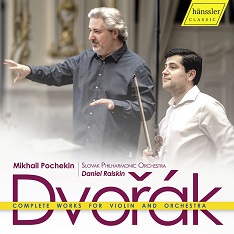Das Cellokonzert von Dvorak ist regelmäßig im Konzert und auch in Einspielungen zu erleben. Das Klavierkonzert und auch das Violinkonzert fristen dagegen ein Schattendasein. Dabei haben auch diese beiden Werke ihre hörenswerten Seiten. Das Violinkonzert erklingt wenigstens ab und zu. Hier ist es zusammen mit zwei weiteren Werken des Komponisten für Violine und Orchester zu hören, nämlich der Mazurka und der Romanze.
Mikhail Pochekin ist ein Geiger, der dieser Musik die slawischen Melodien und Elemente zu entlocken weiß. Gleichzeitig bleibt er aber in seinen Interpretationen dem klassischen Ansatz verbunden, so dass er die volkstümlichen Anteile und auch sonst den Duktus stilvoll handhabt und nicht überzuckert. Die Romanze geht Pochekin einen Hauch schneller an als üblich, denn er empfindet das Tänzerische eher im Sinne eines auf slawische Umstände angepassten Siciliano, was man beim lyrischen Titel Romanze zunächst nicht so vermutet. Dadurch bietet er ein neutraleres, weniger triefendes, Klangerlebnis an. Über alle drei Werke gehört liefert er somit ausgewogene und rundum wohlgeformte Interpretationen.
Die Slowakische Philharmonie unter Leitung von Daniel Raiskin ist dem Solisten ein solide aufspielender Partner, der die interpretatorischen Ansätze reibungsfrei unterstützt. Damit liefern die Beteiligten frische und von Schmonzetten freie Deutungen der drei Werke.
Dvorak’s Cello Concerto can be heard regularly in concert and also in recordings. The Piano Concerto and the Violin Concerto, on the other hand, lead a shadowy existence. Yet these two works also have their worthwhile aspects. The Violin Concerto is at least heard from time to time. This album reunites it with two other works for violin and orchestra, namely the Mazurka and the Romance.
Mikhail Pochekin is a violinist who knows how to elicit the Slavic melodies and elements from this music. At the same time, however, he remains connected to the classical approach in his interpretations, so that he handles the folk elements and the style with style and does not overdo it. Pochekin takes the Romance a touch faster than usual. This is because he feels the music more like a dance in the sense of a Siciliano adapted to Slavic circumstances, which one might initially not assume from the lyrical title Romanze. As a result, he offers a more neutral, less pathetic sound. He thus delivers balanced and well-formed interpretations across all three works.
The Slovakian Philharmonic Orchestra under the direction of Daniel Raiskin is a solid partner for the soloist, supporting the interpretative approaches without friction. The participants definitely deliver fresh interpretations of the three works that are completely free of schmaltz.


















